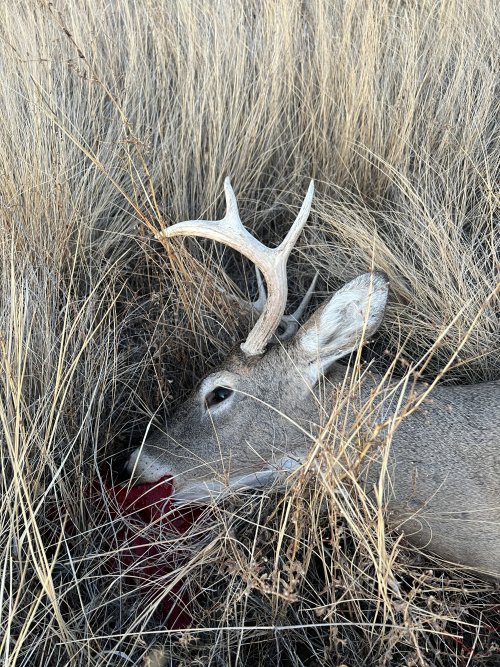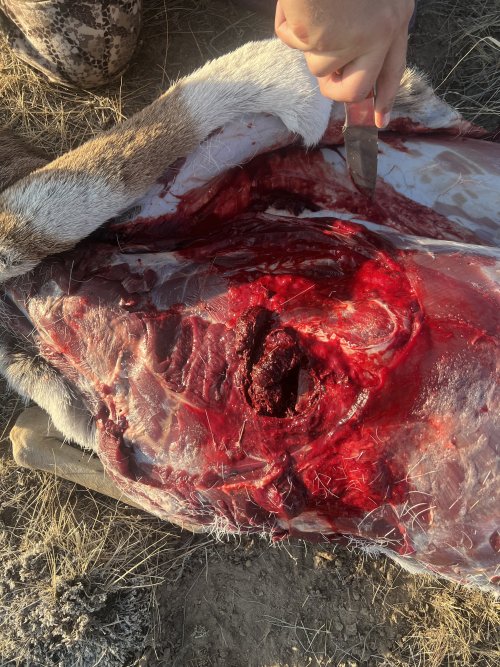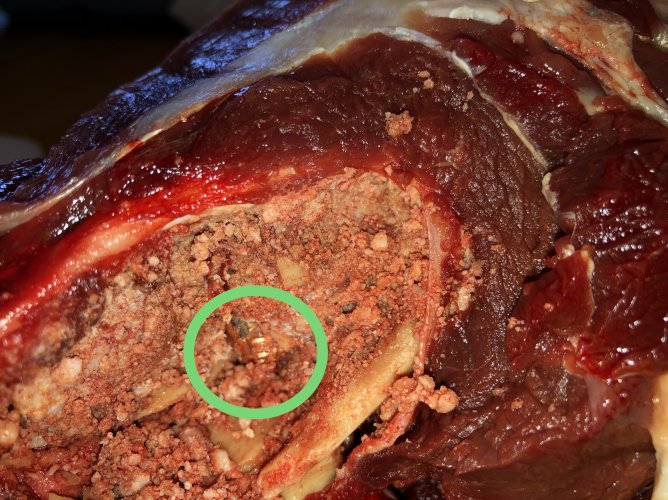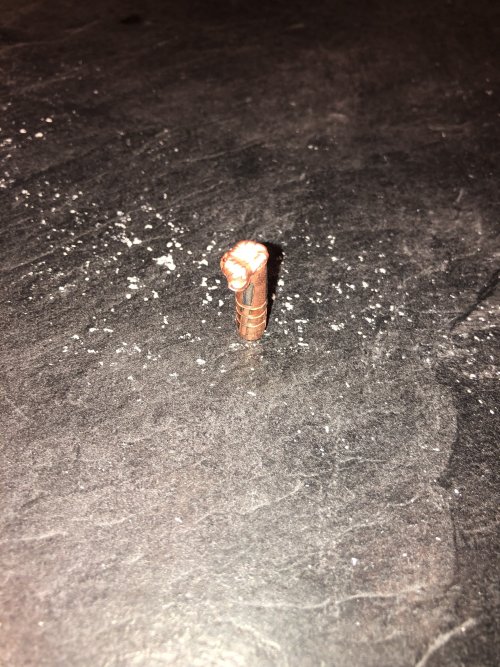And that clearance isn't just unique to Hammers. mtmuleyJust checked that conversation, makes me want to leave a bit more clearance in the mag in my load development.
Navigation
Install the app
How to install the app on iOS
Follow along with the video below to see how to install our site as a web app on your home screen.
Note: This feature may not be available in some browsers.
More options
You are using an out of date browser. It may not display this or other websites correctly.
You should upgrade or use an alternative browser.
You should upgrade or use an alternative browser.
Bullet Failure?
- Thread starter PawPawWPG
- Start date
mevertsen
Well-known member
I've beat up many soft points as well.And that clearance isn't just unique to Hammers. mtmuley
Caseknife
Well-known member
Have always worked on the premiss that just leave enough room so the rounds won't bind, not giving enough thought to damage to tips under recoil. Will have to rethink my process.And that clearance isn't just unique to Hammers. mtmuley
slatebuilder
Well-known member
- Joined
- Jan 27, 2018
- Messages
- 650
People make way more out of picking a projectile to effectively kill stuff than they need too.
slatebuilder
Well-known member
- Joined
- Jan 27, 2018
- Messages
- 650
Maybe I missed it somewhere in the thread, but what did the wound channel look like?Was this a bullet failure or something that just happens? The majority of my hunting has been done with a straight-wall rifle so I don’t have a lot of experience with recovering actual rifle bullets - just shooting them.
This is a Hammer Hunter 143 grain bullet shot out of a .280 AI that hit a cow moose at the base of the ribs. She quartering slightly away and I recovered at the hide on her other side. 85 yards. Chrono’d these rounds at an average of 2995 FPS.
Any input would be great - I’d hate to have to pull the rest of the bullets that I have.
PawPawWPG
Active member
- Joined
- Jun 13, 2019
- Messages
- 94
To be honest I was so excited to have taken a moose that I didn’t inspect it until I found the bullet, and by that time we had it quartered out.Maybe I missed it somewhere in the thread, but what did the wound channel look like?
slatebuilder
Well-known member
- Joined
- Jan 27, 2018
- Messages
- 650
UnderstandableTo be honest I was so excited to have taken a moose that I didn’t inspect it until I found the bullet, and by that time we had it quartered out.
Big Sky Guy
Well-known member
- Joined
- Dec 10, 2018
- Messages
- 644
Can someone explain the theory how getting a speck of dust or dirt in a tip inhibits expansion? Or how a damaged tip can? My limited understanding tells me a projectile moving that fast should expand upon impact regardless. Very perplexing to me.
I ask because I had a similar experience with a Barnes TTSX out of a 6.5cm. <150 yards so velocity should have been well above the internet accepted minimum of 2k fps. It was lodged backwards in the offside front leg bone.
I’ve had plastic tipped bullets get dinged up from recoil, have thought about putting a small piece of foam on that front side of the mag well but have never noticed a decrease in accuracy and never thought it would impact expansion.
I ask because I had a similar experience with a Barnes TTSX out of a 6.5cm. <150 yards so velocity should have been well above the internet accepted minimum of 2k fps. It was lodged backwards in the offside front leg bone.
I’ve had plastic tipped bullets get dinged up from recoil, have thought about putting a small piece of foam on that front side of the mag well but have never noticed a decrease in accuracy and never thought it would impact expansion.
Attachments
Addicting
Well-known member
Looks like 3 of the 4 petals sheared off. Looks like it did fine and had enough velocity to snap the petals. Being backwards inside means nothing as bullets do funny stuff inside an animal.Can someone explain the theory how getting a speck of dust or dirt in a tip inhibits expansion? Or how a damaged tip can? My limited understanding tells me a projectile moving that fast should expand upon impact regardless. Very perplexing to me.
I ask because I had a similar experience with a Barnes TTSX out of a 6.5cm. <150 yards so velocity should have been well above the internet accepted minimum of 2k fps. It was lodged backwards in the offside front leg bone.
I’ve had plastic tipped bullets get dinged up from recoil, have thought about putting a small piece of foam on that front side of the mag well but have never noticed a decrease in accuracy and never thought it would impact expansion.
Forkyfinder
Well-known member
- Joined
- Dec 13, 2023
- Messages
- 3,754
I have started using game kings I don’t shoot enough animals for statistical analysis but I like them so far.

.30 Cal 175 Gr. HPBT GameKing - Sierra Bullets
The exact duplicate of the renown 175 grain Matchking. The 175 hollowpoing boattail Gameking has the same ogive profile and dimensions of the MatchKing. This allows you to have a true Match bullet and a Hunting bullet that will require no seating die changes. This bullet was designed to give...
These?
VikingsGuy
Well-known member
Call me simple, but sounds like the bullet did its job - resulted in a carcass not a wounded animal. I understand why we want expansion (or more like petal shedding in the case of Hammers) - and anything close to a semi-predictable failure to take animals cleanly would be a problem I would not accept. But the several dozen large ungulates my son and I have killed with TTSX and Hammers have all been on the ground with a single shot and within 50 feet of were they were hit, with most being down where they stood. Zero second shots needed, zero tracking wounded animals, zero lost animals, no lingering wounded animal. They were all dead by the time we could walk to them. Thousands of hunters are using monos and you just don't hear that many credible stories of guy with proper cartridge and good shot placement losing animals. Always nice to get that expanded bullet on the backside hide, but in my view a clean kill is a clean kill. The proof is not in the bullet but in the wound cavity, and in all our experiences the chest cavity has looked like it was put through a blender, whether we recovered a bullet, it "penciled through" or had a big exit. We have has similar luck with the flat tipped FTX for 30-30 lever. These things shoot great and kill great in our hands. Each guy can make is own call, but this thread doesn't cause me to think about going back to lead for 1 second.
Hammsolo
Well-known member
- Joined
- May 16, 2020
- Messages
- 2,195
I’d bet those bullets have probably taken more game than any other animal. They by no means suck just technology has improved
I like the typo in here, but I know what you meant. Bullet construction has had to improve as powders have improved and cartridge design has grown and improved. Higher velocities require tougher bullets.
Ol’ Wayne told me about his first hunts with the 300 wm back in the day. The old Hornady and Core Lokts turned into grenades. I believe they’ve stiffened up alloys and changed the thickness of walls, but there are too many great options for modern designs now.
I’ve killed about ten big game animals with Hammers and none have gone more than 100 yards. Ranges were from 40 to 355 yards. I haven’t recovered any bullets though… This year’s deer and pronghorn wound channels were devastating. Pronghorn went about 50 yards coughing up foamy blood from a 355 yard quartering to me from right to left shot. The whitetail went 13 paces from a broadside 250+ yard shot.
My rifle loves them, but I think I will go tipped in the future. Could it hurt? Do we need a “wound channel thread?”


Pronghorn exit wound
This is my first year with hammers. 137g hht out of a .308. I have shot 2 bulls and and antelope buck this year.
Bull, 80 yards frontal: died on its feet and rolled 10 yards
Antelope buck, 280 yards broadside: died where it stood
Bull, 60 yards bedded broadside: shot was slightly back and he stood up and visibly struggled for about ten yards before I shot him a second time. Dropped with second shot.
I am very happy with the hammers so far this year. I have three deer tags and another elk tag to go this year. Hopefully I get the opportunity to use a few more rounds this year!
Bull, 80 yards frontal: died on its feet and rolled 10 yards
Antelope buck, 280 yards broadside: died where it stood
Bull, 60 yards bedded broadside: shot was slightly back and he stood up and visibly struggled for about ten yards before I shot him a second time. Dropped with second shot.
I am very happy with the hammers so far this year. I have three deer tags and another elk tag to go this year. Hopefully I get the opportunity to use a few more rounds this year!
Don Fischer
Well-known member
- Joined
- Jun 27, 2017
- Messages
- 3,183
I don't shoot monolithic bullet's, to spendy for me and over the years I think I found the right cup and core will do all I need. Years ago shooting a 308 with HP bullets into bailed newspaper at 100yds, I found that the HP on them was closing and the bullets were bending penetrating. At that time they were probably Match Kings. The result was I never bought HP bullets again. Oh yea, they did retain 100% of their weight but the bullets also bent!
On another site African guide J.J. Hack did some post's on the monolithic bullets, several years ago, and one of his concerns with them was the HP closing up.
Some time back I was reading about Winchester Monolithis bullet's, don't know who makes them, and they claimed that all their hp bullet's had plastic tips in them to insure the bullets opened up. Strange That was what J.J. Hack recommended they do with those bullets for the same reason. A thing I suggest when choosing bullets is give them a little though and I believe all bullet's properly placed for the bullet will kill very well. Something penetrates an animal and disrupts a vital system enough and the critter is going to die. Even bullet's recover from animals claimed to have failed still managed to have killed the animal! Example of bullets failing would be 100 gr bullets from my 25-06 and 140gr bullet's from a 7x57 I had years ago. Now both bullet's in the process of killing actually killed the animals. What I consider failing is doing to much damage to eatable parts of the animal, well excessive damage! I found they way to greatly reduce that, was to go to heavier bullet's at lower velocity and place them better. Big stories about bullet's with the ability to kill at long range, shoot old 50 cal muzzle loaders have been said to do that! Those muzzle loader bullet's probably had lousy BC's! How could that happen? Actually quite easily. A very good shooter placed a bullet correctly to kill the animal, that seems to me to be about it. Or maybe a poor shooter that somehow hit the animal just right!
My though about bullet failure is bullets properly placed for the purpose they are being used for do not fail. What fails is placement of the bullet by the shooter. I have an old box of Remington 22 shorts here. Inside the flap, Remington claims they are dangerous to one mile. Huh, I bet at one mile it's gonna depend a lot on where the bullet hits to determine just how dangerous the bullet is! For even at one mile for that bullet to kill something, it must penetrate to a critical place and disrupt it badly! Probaably that bullet hits in your ear hole, your dead. It hits you in the foot your not dead but either way your hurt.
So to me bullet's don't fail, shooter's fail by choosing poor bullets for the job at hand and placing them poorly. Seems this bullet failure problem has been around a lot longer than I have but over time I have come to the conclusion that bullet's don't fail when properly chosen and placed, shooter's fail by not making good choices and/or poorly placing bullets. If your choice is a light weight bullet at high velocity you should expect the bullet to have trouble penetrating and delivering a killing blow with less than ideal placement. A 50gr Hornady SX used to be claimed to blow up in the air at over 3500fps. Tried that in a 22-250 and shure enough they did, you could see it happen. Yet the same bullet at far less than 3500fps placed in the neck close to the head killed right there and destroyed little meat. So what failed, the bullet or it's use? The Indian lady in Canada that killed the then world record grizzly with a single shot 22 RF and a long case, seems the bullet did not fail! She carefully shot the thing right where she knew the bullet would penetrate and kill it. She also waited for the bear to get into range where she could make the shot. I would not care to try that myself but have seen a good number of livestock killed in slaughter house's with noting more than either a 22 rifle or a blow from an air hammer. So I don't believe bullet failure exists, shooter failure certainly does!
On another site African guide J.J. Hack did some post's on the monolithic bullets, several years ago, and one of his concerns with them was the HP closing up.
Some time back I was reading about Winchester Monolithis bullet's, don't know who makes them, and they claimed that all their hp bullet's had plastic tips in them to insure the bullets opened up. Strange That was what J.J. Hack recommended they do with those bullets for the same reason. A thing I suggest when choosing bullets is give them a little though and I believe all bullet's properly placed for the bullet will kill very well. Something penetrates an animal and disrupts a vital system enough and the critter is going to die. Even bullet's recover from animals claimed to have failed still managed to have killed the animal! Example of bullets failing would be 100 gr bullets from my 25-06 and 140gr bullet's from a 7x57 I had years ago. Now both bullet's in the process of killing actually killed the animals. What I consider failing is doing to much damage to eatable parts of the animal, well excessive damage! I found they way to greatly reduce that, was to go to heavier bullet's at lower velocity and place them better. Big stories about bullet's with the ability to kill at long range, shoot old 50 cal muzzle loaders have been said to do that! Those muzzle loader bullet's probably had lousy BC's! How could that happen? Actually quite easily. A very good shooter placed a bullet correctly to kill the animal, that seems to me to be about it. Or maybe a poor shooter that somehow hit the animal just right!
My though about bullet failure is bullets properly placed for the purpose they are being used for do not fail. What fails is placement of the bullet by the shooter. I have an old box of Remington 22 shorts here. Inside the flap, Remington claims they are dangerous to one mile. Huh, I bet at one mile it's gonna depend a lot on where the bullet hits to determine just how dangerous the bullet is! For even at one mile for that bullet to kill something, it must penetrate to a critical place and disrupt it badly! Probaably that bullet hits in your ear hole, your dead. It hits you in the foot your not dead but either way your hurt.
So to me bullet's don't fail, shooter's fail by choosing poor bullets for the job at hand and placing them poorly. Seems this bullet failure problem has been around a lot longer than I have but over time I have come to the conclusion that bullet's don't fail when properly chosen and placed, shooter's fail by not making good choices and/or poorly placing bullets. If your choice is a light weight bullet at high velocity you should expect the bullet to have trouble penetrating and delivering a killing blow with less than ideal placement. A 50gr Hornady SX used to be claimed to blow up in the air at over 3500fps. Tried that in a 22-250 and shure enough they did, you could see it happen. Yet the same bullet at far less than 3500fps placed in the neck close to the head killed right there and destroyed little meat. So what failed, the bullet or it's use? The Indian lady in Canada that killed the then world record grizzly with a single shot 22 RF and a long case, seems the bullet did not fail! She carefully shot the thing right where she knew the bullet would penetrate and kill it. She also waited for the bear to get into range where she could make the shot. I would not care to try that myself but have seen a good number of livestock killed in slaughter house's with noting more than either a 22 rifle or a blow from an air hammer. So I don't believe bullet failure exists, shooter failure certainly does!
ImBillT
Well-known member
- Joined
- Oct 29, 2018
- Messages
- 3,940
Of course. I was just pulling your leg.You know what I mean. mtmuley
Clearly the bullet killed the animal, but it definitely failed to expand.
My experience with monos have been fine - used some Barnes 145 LRX for a bull elk and two whitetail bucks this season. At $25/box on clearance this summer, they were a much cheaper option than Hammers (even though I had the 145 HHT shooting well).
My experience with monos have been fine - used some Barnes 145 LRX for a bull elk and two whitetail bucks this season. At $25/box on clearance this summer, they were a much cheaper option than Hammers (even though I had the 145 HHT shooting well).
Most Factory 280 AI are 1:9 twist that I have seenIs it a factory barrel punched to AI or a custom rebarrel?
If it’s factory it’s probably a 1:10 and not enough twist.
I’ve heard of a couple extreme cases where a hollow point mono hitting a tree limb or bone could close the opening causing the bullet not to expand. I’ve never personally experienced this or anyone I know.
My wife and I have killed plenty of big game using mono’s with no issues. Goes to show any bullet can fail though.
My wife and I have killed plenty of big game using mono’s with no issues. Goes to show any bullet can fail though.
Similar threads
- Replies
- 14
- Views
- 468
- Replies
- 3
- Views
- 263
- Replies
- 43
- Views
- 964






